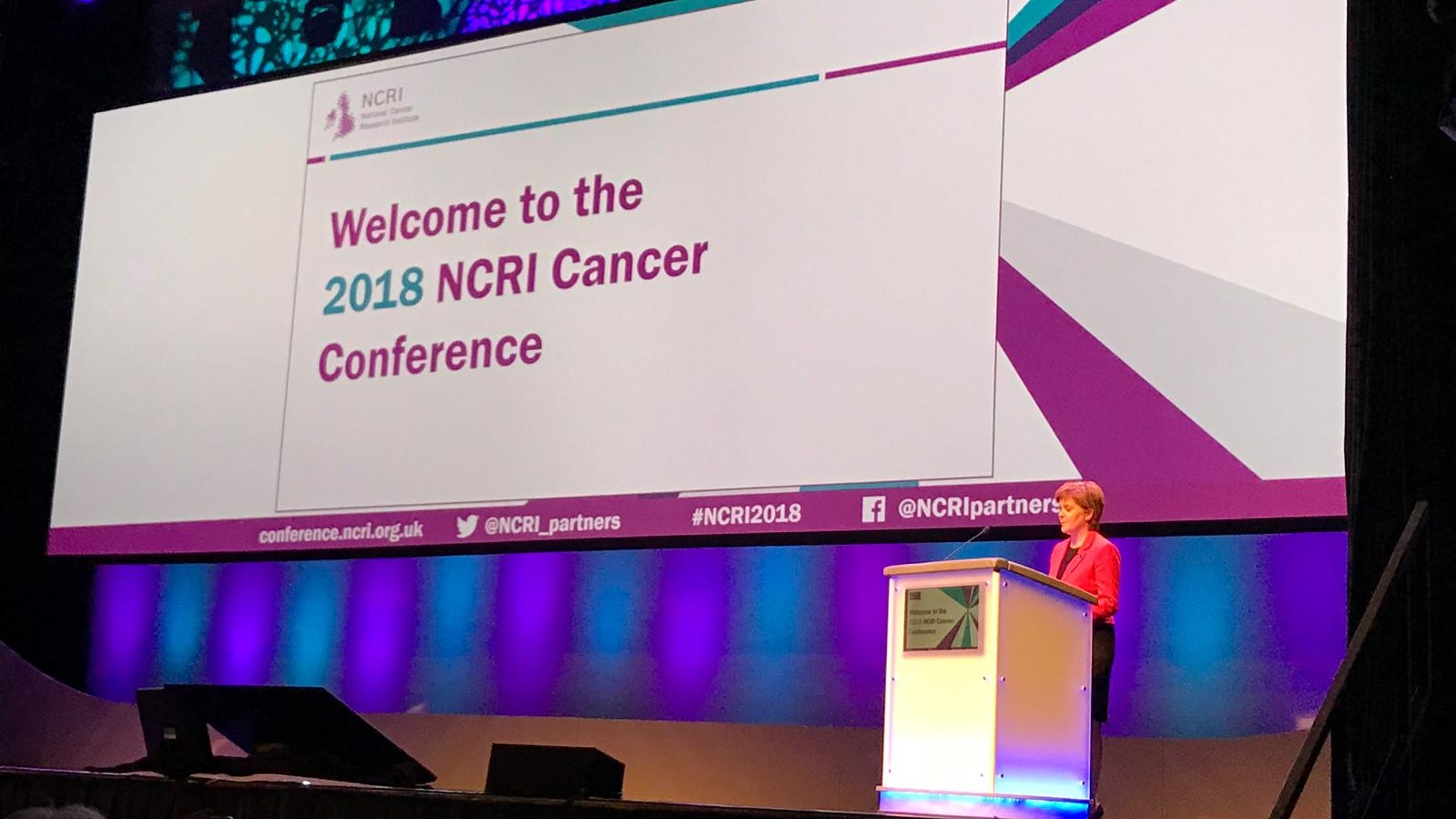
Image: Nicola Sturgeon opens NCRI 2018. Credit: Roya Ziaie
This year The Institute of Cancer Research, London, is in Scotland to attend the National Cancer Research Institute (NCRI) annual conference. As the UK’s largest platform for cancer researchers, clinicians, industry and patients to showcase the latest advances in cancer research, the ICR will be reporting on the cutting-edge science throughout.
As the 2018 NCRI Conference kicks off, staff, scientists and students from the ICR gather in Glasgow for a jam-packed three days to hear about the major findings from the conference.
With around 1,500 cancer specialists attending the conference each year and 500 presentations from national and international leaders, it is an opportunity to hear about the latest research and to network with some of the world leaders in cancer research.
Nicola Sturgeon, First Minister of Scotland, introduced the conference – and stressed how important cancer research and innovation are to the country’s £100m national cancer strategy.
Here are some highlights from today’s talks:
Understanding cancer evolution
Professor Swanton described data from Cancer Research UK’s TRACERx study into non-small cell lung cancer and kidney cancer. He talked about how cancers that gain multiple copies of chromosomes – the packages of DNA within cells – are more likely to become genetically unstable, meaning they are more likely to contain genetic errors, and to evolve more rapidly.
When cancer cells evolve and accumulate new mutations, it can cause them to become resistant to treatment and aid their spread to other parts of the body.
Professor Swanton also talked about different patterns of cancer evolution associated with progressively more aggressive forms of cancer – linear evolution, a Darwinian branching pattern, or sudden jumps forward leading to particularly aggressive disease.
He said understanding the pattern of cancer evolution in individual patients can help in the design of personalised combination treatments for them.
Catch up with all the latest ICR blog posts and video content from the 2018 National Cancer Research Institute (NCRI) conference 2018 in Glasgow.
Read more
Genetics in cancer prevention
He outlined the various risk factors for bowel cancer – including modifiable factors like diet, physical activity and smoking, and non-modifiable factors like age, sex and genetic predisposition.
And he showed that understanding how these different factors interact was already leading to the design of personalised strategies for cancer prevention.
People at high genetic risk could for example be offered regular monitoring and screening for bowel cancer, and interventions such as removal of polyps, bowel surgery or regular aspirin to prevent the disease.
As an example, he discussed people with mutations in the APC gene – which without intervention would almost always cause the development of bowel cancer. Monitoring these patients, and offering them various preventative strategies, had been successful in dramatically reducing incidence and mortality from the disease over the last 20 years.
Guiding immunotherapy with imaging
In recent years there has been an explosion in interest in immunotherapy for cancer, with a series of trials showing that the approach can have major benefits for a proportion of cancer patients.
Immunotherapy works by awakening the immune system and directing it against tumours.
One example is an injection of a substance which emits fluorescent light in the presence of the OXO40 gene – allowing immune cell activity to be measured.
Using this technique, researchers can track the movements and activity of immune cells during a type of treatment called CAR-T cell therapy, in which patients’ immune cells are removed, genetically modified and retransfused.
Professor Gambhir showed how this could even indicate previously unknown sites of cancer spread, by showing where the immune cells go after being given back to the patient.
A new approach to children’s brain cancer
Professor Gilbertson said that, despite the exciting advances made in cancer research over the last decade, the current focus on treatment over prevention is “unsustainable and unworkable”. He said that by increasing our knowledge of why and how cancers occur in the first place, we could cut deaths through early detection and prevention.
He discussed research showing that the way genes are activated in the developing mammalian embryo could be linked to their role in the origin of different childhood brain cancers.
This work could have implications for both prevention and treatment – and the Cancer Research UK Cambridge Institute is working with our own researchers at the ICR to discover new targeted drugs.
Coming up
These are just the highlights from the conference’s opening day, with much more to come. There will be new and different sessions each day, with ICR research to be presented throughout – including on new liquid biopsies techniques, exploiting cancer’s molecular vulnerabilities, new cancer therapies and the use of digital pathology.
To keep updated on the conference, and to find out how ICR scientists are paving the way for cancer research, follow @ICR_London and #NCRI2018 on Twitter for all the latest.
comments powered by